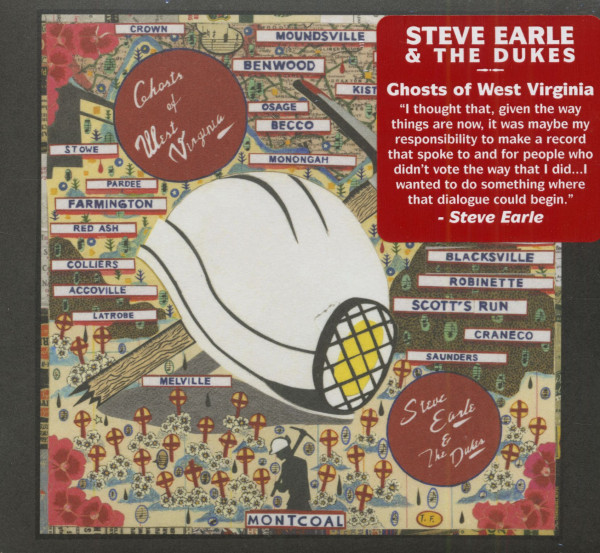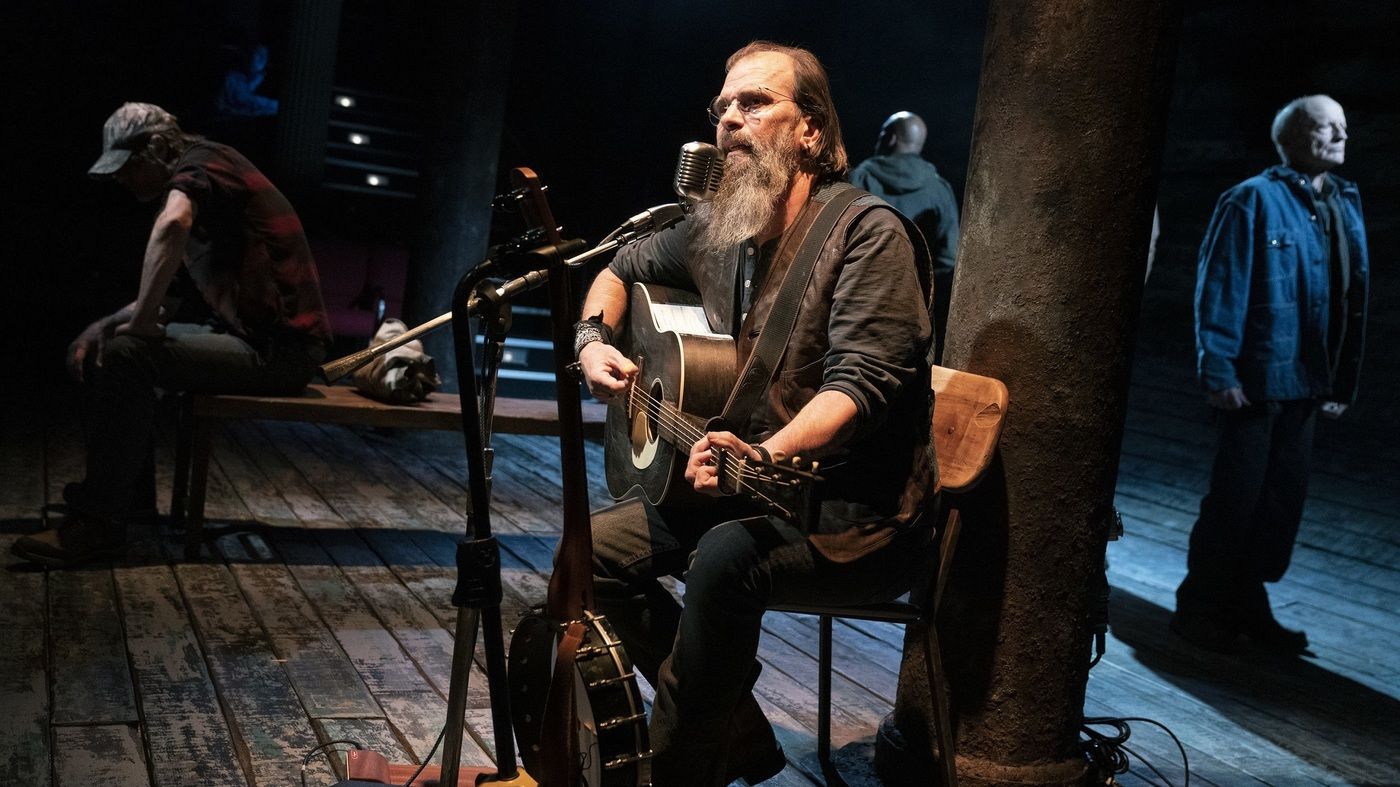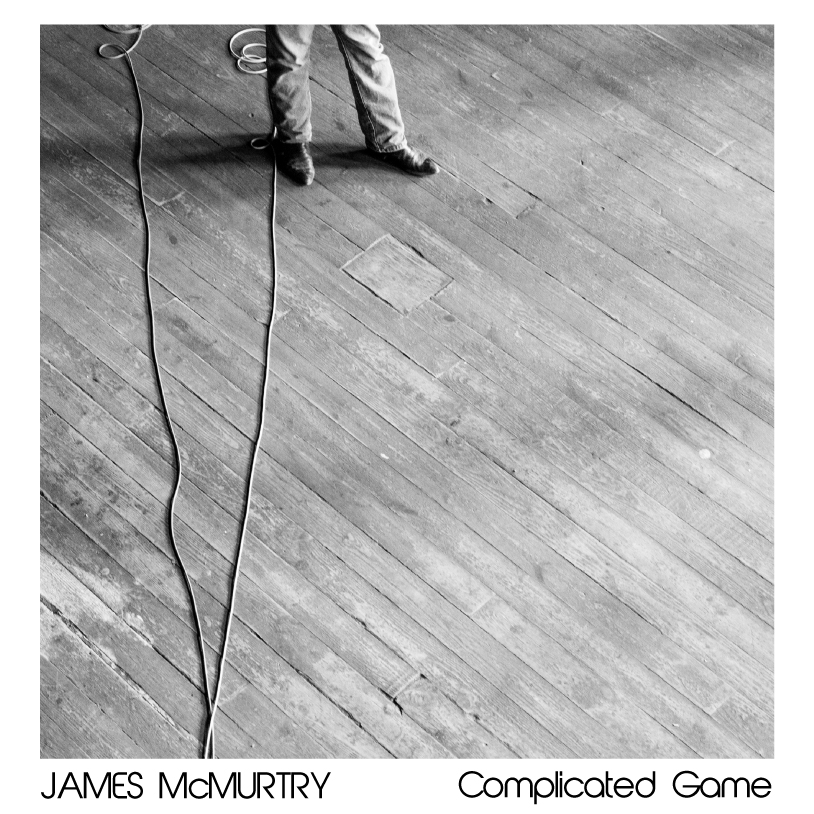
“Ghosts of West Virginia” album cover. Courtesy www.bear-family.com
Exacerbated by the January 6 Capitol mob attack, President Biden’s greatest domestic challenge is bridging the chasm between “red” and “blue” America, as deep and wide as any Appalachian valley. Thus, Steve Earle’s brilliantly insightful 2020 album, Ghosts of West Virginia, is so pertinent.
It took courage and empathy, but this Texas liberal imaginatively inhabits the lives of West Virginia coal miners – among Donald Trump’s most forsaken followers. 1 Earle’s outlaw country singer-songwriter sensibilities might’ve helped him to connect with the lives and spirits of other “outsiders” of sorts, plus he’s a native of the neighboring Confederate state of Virginia. 2
Ghosts became the soundtrack to a 2020 documentary theater work, inspired by the tragic 2010 explosion in the Upper Big Branch mine in West Virginia, Coal Country, written by Jessica Blank and Erik Jensen.

Steve Earle performs material from “Ghosts of West Virginia” in a live performance of the 2020 theater documentary “Coal Country.” Courtesy Pinterest
Earle’s crusty singing, and the sinewy band playing, often sound as expressive as the heaving guts of a working miner, or his exhalation in pained repose and reflection. Earle unearths richly peopled story-songs, “Devil Put the Coal in the Ground,” at once grave and scathingly boisterous, or the deep-veined singing and words of “Time is Never On Our Side,” as if Earle is tenderly scraping shards of blood-stained coal from the blast’s ravaged site. “Black Lung” is a worker defiantly testifying to The Grim Reaper, about the industry’s deadliest side-effect. On “Union, God and Country,” Earle deftly personalizes the history of mining unions, their decline, and the company’s ease in exploiting unrepresented workers.
Earle doing a solo version of “Devil Put the Coal in the Ground”:

Despite Trump’s promises, West Virginia coal miners and their industry lost both jobs and production during his administration. Courtesy commondreams.org
Hear also the achingly lovely widow’s lament “If I Could See Your Face Again” sung by the Dukes’ Eleanor Whitmore, and the indignant “It’s About Blood,” where Earle lays blame, and ends with resounding recitation of all twenty-nine Upper Big Branch blast-victim names, like an aural tour of a fresh grave site. It rings, too, like hammers on buttresses of a rising bridge to a better, more whole America: “It’s about muscle/ it’s about bone/ it’s about a river running thicker than water/ ’cause it’s about blood.”
When I saw Earle this summer at the Big Top Chautauqua in Bayfield, Wisconsin, he performed “It’s About Blood” and, sure enough, at the end, he recited the twenty-nine dead men’s names from memory, with raw, stentorian power. And now it seemed as if they were a band of brothers, his very own, and the names had lacerated his heart with so many scars.
But the bridge across America was still rising.
This review was originally published in shorter form in The Shepherd Express: https://shepherdexpress.com/music/album-reviews/ghosts-of-west-virginia-by-steve-earle-the-dukes-new-west/
***
Earle’s magnificently immersive evocation and its vividly-drawn characters – amid our careening political zeitgeist – helped me circle back to another important Texas songwriter. James McMurtry may have surpassed Earle as America’s greatest living male singer-songwriter “south of Bob Dylan,” as I put it in my review of McMurtry’s quietly stupendous 2015 album Complicated Game (Joni Mitchell and Lucinda Williams prompt the gender qualifier). I’ve been watching many of McMurtry’s almost-weekly solo home virtual concerts during the pandemic, which have helped me burrow deeper into his artistic sensibilities.
He lacks the vocal expressive range of Earle or Williams but, as Texas music writer Mike Seely aptly puts it, McMurtry is “rivaled only by Jason Isbell in his ability to construct compelling tales of small-town pathos without sounding patronizing, McMurtry doesn’t exploit his characters or paint them in overly dour strokes…” 3

“Complicated Game” album cover
So I returned to my thoughts about Complicated Game, in striving to understand the psychological makeup of a small-town, rural or working-class Trump voter, especially one who has real-world grievances and hardships, rather than racist hatred, or off-the-deep-end conspiracy-theory intoxication.
For these genuinely struggling people, intoxication may not be the word, but there’s a power Trump has over many of them, the kind who attend his rallies, and who may have shown up on January 6 to protest. Some of them may have not realized the protest would lead to forcibly attempting to stop the election’s certification. But to be clear, Trump’s demagogic culpability clearly includes cultivating the disinformation propaganda campaign that led to the protest rally, stoked by radicalized right-wing groups, and then inciting the attack. Even GOP Senate leader Mitch McConnell strongly concurred (despite his hypocritical impeachment conviction vote).
Nevertheless, for possible bridge-building that such cultural beacons as Earle and McMurtry might imagine, let’s step back and contemplate the dynamic between Trump and his loyal people. He does boast an easy-sell spiritual elixir, especially in his speaking voice’s persuasiveness, as author and cultural critic Lorrie Moore has observed. What she sees as “reassuring” is the smoke in Trump’s mirrors, the quivering illusion that he, and only he, can fix their problems. Hear out this liberal writer, who’s spent most of her teaching career in Madison, Wisconsin:
“So sue me: I sometimes find President Trump’s voice reassuring. Not what he says. Not the actual words (although once in a while one of his “incredibles” reaches inside my chest cavity and magically calms the tachycardia). Trump’s primitive syntax, imperfectly designed for the young foreign woman he married, always dismays. But during a coronavirus-task-force press conference, when one hears him on the radio, his voice has music. Sorry. It does. A singer’s timbre; it is easy on the ear. Trump’s is a voice you use to calm down people you yourself have made furious. (His foremost mimics—Alec Baldwin, Stephen Colbert—have not captured its pitch, its air, its softness, which they substitute with dopiness, which is also there.) For the first ten minutes, before his composure slackens and he becomes boastful and irritable, he actually just wants to be Santa Claus in his own Christmas movie, and the quality of his voice is that of a pet owner calming a pet. I hear it!” 4
To be honest, I do, too. So it seems such people fall prey to this vocal intoxication, and achieve an almost zombie-like state of acceptance, wallowing in wish-fulfilment, harkening to a lost, pure, white America that never really existed. It’s the essence of Trump’s populist demagogic appeal. But who are these people, and what makes them tick?
The typical aggrieved Trump voter is a middle-aged white male – like Earle and McMurtry – so the songwriters inhabit their empathetic characterizations like walkers-in-their-shoes, having long-observed humanity closely in Texas, the virtual Southern nation-unto-itself, and in the petri dishes of their art’s genius.
Here I refer back to my review of Complicated Game. To me, the album achieves a greatness perhaps unparalleled in recent times, partly because it sounds as confessional as it is observational. Several superb songs about the vicissitudes of love (discussed in my full-length review) are first-person and feel autobiographical, whether they are or not. 5

James McMurtry. Courtesy photosbynanciblogspot.com
This puts McMurtry at the same psychological level of his scruff-necked American archetypes – living and losing, and somehow bubbling back to the surface, right before drowning. And on Game, McMurtry casts a perspective that seemingly reaches across the nation’s myriad highways and byways.
McMurtry typically offers a dead-insect windshield view — but which retains the land and the people’s tough, odds-defying spirit. “Carlisle’s Haul” frames such harsh magnificence in terms of a crab-fishing job, done after the fishing season’s closed: “It’s hard not to cry and cuss/ when this old world is bigger than us/ and all we got is pride and trust in our kind.” McMurtry’s observational story-telling powers have been compared to those of his father (Larry McMurtry, who wrote The Last Picture Show, Lonesome Dove and the screenplay to Brokeback Mountain, among other indelible works).
But the younger McMurtry also recalls Charles Dickens in the way his gritty details and array of eccentric-but-familiar characters serve a broader critique of society, industrialization, and globalization. His renowned 2005 protest anthem “We Can’t Make It Here” still encapsulates the betrayals of America’s economic times as well as anything.
Consider: The world’s billionaires increased their wealth by about a fifth over the course of last year – to more than $11 trillion, according to Forbes. Meanwhile, a quarter of U.S. adults said someone in their household was laid off or lost a job because of the pandemic.” 6 That’s how well Trump has fulfilled his promises to his blue-collar followers.
“Complicated Game begins to feel like a great artist’s most mature statement to date, and also a recording that ought to resonate across the nation’s political spectrum for its invocations of American freedom, and of its discontents. Both seem to flow through McMurtry’s veins by now. But he’s holding steady. 7
“ ‘Deaver’s Cross’ is a righteous bluegrass song and the first of two remarkably magnanimous pieces for a guy stereotyped as a grumpy pessimist: So when you’re fishing that March brown hatch/ Won’t you share your morning’s catch/ with those whose ground you walk across/ May their memory be not lost.
“A song that follows, after a few of the tough-minded ones, reminds us that, though unmistakably a worn-denim Texas troubadour, McMurtry has clearly traversed America, gigging and searching for dusty companionship. And he sure can celebrate, even as he stares down reality, in the lovely, Uilleann-piping ode to ‘Long Island Sound.’ Riding a gentle, rolling melodic wave evoking that long, lapping coast, he sings: These are the best days, these are the best days, boys put your money away, I got the round. Here’s to all you strangers, the Mets and the Rangers, long may we thrive on the Long Island Sound.
It’s the understated peak of the record and it catches the setting sun on a horizon of rooftops, because McMurtry has climbed this high to see what a magnificent place the great old island is. And then, the two closing lines are poetic strokes — he might be looking at Anywhere, U.S.A.
 Liner photo from James McMurtry’s “Complicated Game.” Photo by Shane McCauley
Liner photo from James McMurtry’s “Complicated Game.” Photo by Shane McCauley
And yet, McMurtry remains too much of a cold-eyed critic of easy social conventions to leave us with only comforting thoughts. The album closes with its strangest song “Cutter,” about a sorry soul who physically mutilates himself with a knife, for reasons ostensibly sociological and psychological, yet ambiguous: “I miss my dog from years ago/ Where he went, I still don’t know./whiskey and coffee while I burn my toast, and build a cage for all my ghosts.” He could be one of countless desperate military veterans, or other American survivors. McMurtry’s under-appreciated vocal vibrato nails the man’s unsteady, just-hanging-on societal mask.
This character feels like just the sort of person who Trump pushed over the edge, into anarchic violence at the Capitol on that fateful January day.
Nevertheless, as (McMurtry) told recently told Rolling Stone, he sees his characters as “enduring, not fading away. Standing against the current that wants to wash you away but can’t, yet.” 8
We can only hope, and strive, for the time when such folks endure as a reasonably healed part of America’s social fabric, while the raw edge of the nation’s anti-democratic and anti-diversity malignance begins to fade away. Musical storytellers like Earle and McMurtry have laid forthright footsteps to follow, and perhaps to a bridge to new understanding, healing and common purpose.
_____
1 The number of people employed by the coal mining industry has fallen 15% since Trump took office in January 2017. Job losses temporarily stabilized during his years in office, according to US Bureau of Labor Statistics Data, but the trend is continuing. Jobs did not increase, partly due to Trump’s trade wars and unsuccessful efforts to use the Defense Production Act to prop up coal plants, before the pandemic curtailed coal demand and employment.
Production has followed suit. Despite coal prices remaining stable around $35 per ton over the last decade, production fell during Trump’s years in office to just 706 million short tons, the lowest amount since 1978, according to the US Energy Information Administration.
2. Earle’s empathy for surviving West Virginia family members now extends to his own profound personal loss. He just released another album, J.T., dedicated to his gifted son, the noted singer-songwriter Justin Townes Earle, who died in August, at the age of 38 of an apparent drug overdose.
3. Mike Seely, https://www.houstonpress.com/music/james-mcmurtrys-10-best-songs-6518030
4. Lorrie Moore, April 13, 2020 https://www.newyorker.com/magazine/2020/04/13/the-nurses-office
5.
James McMurtry’s “Game” reveals more of himself, and of a vividly evoked America
6. Vauhini Vara, “The United States of Amazon,” The Atlantic, March 2021, 93
7. I was even more prompted to revisit, and extoll, McMurtry’s album because it, and McMurtry himself, still seem underappreciated. I surveyed two appropriate “Best of” lists: UDiscoverMusic‘s “The 10 Best Americana Albums of All Time,” (published in May of 2020)
, and Paste Magazine’s “50 Greatest Alt-Country Albums,” (published in August 2016). https://www.pastemagazine.com/music/alt-country/the-50-best-alt-country-albums-of-all-time/
Neither list includes Complicated Game, much less any McMurtry album. Interestingly, Lucinda Williams’ Car Wheels on a Gravel Road, is Number 2 on both lists, and Earle tops the “Ten Best” list with his Copperhead Road album. Several other Earle albums make Paste‘s “50 Greatest”, as does Jason Isbell’s Southeastern.
Are these big-picture best-of lists too high a bar for McMurtry? I don’t think so.
More encouragingly, Complicated Game scores 87 with MetaCritic, indicating “universal acclaim” based on 9 reviews (including Paste‘s). Isbell’s Southeastern also scores an 87 with Metacritic, which began in 2001, so the iconic Williams and Earle albums predate the site, which measures an album’s contemporary critical reception. Game also was voted No. 3 in NoDepression.com‘s Top 50 albums of 2015, and scored in All-Music‘s list of 22 Favorite Singer-Songwriter albums of 2015. History will have the last say.



